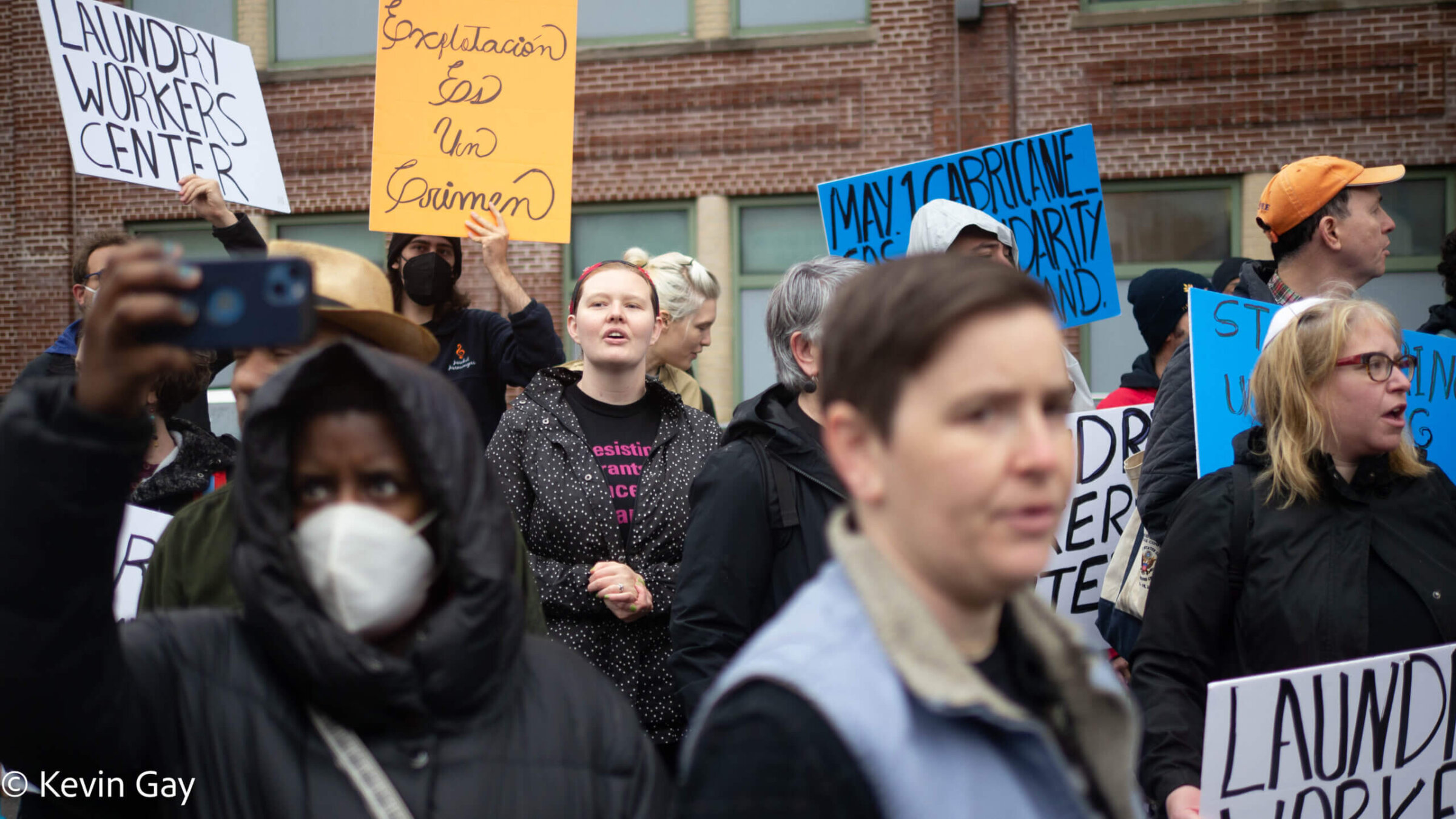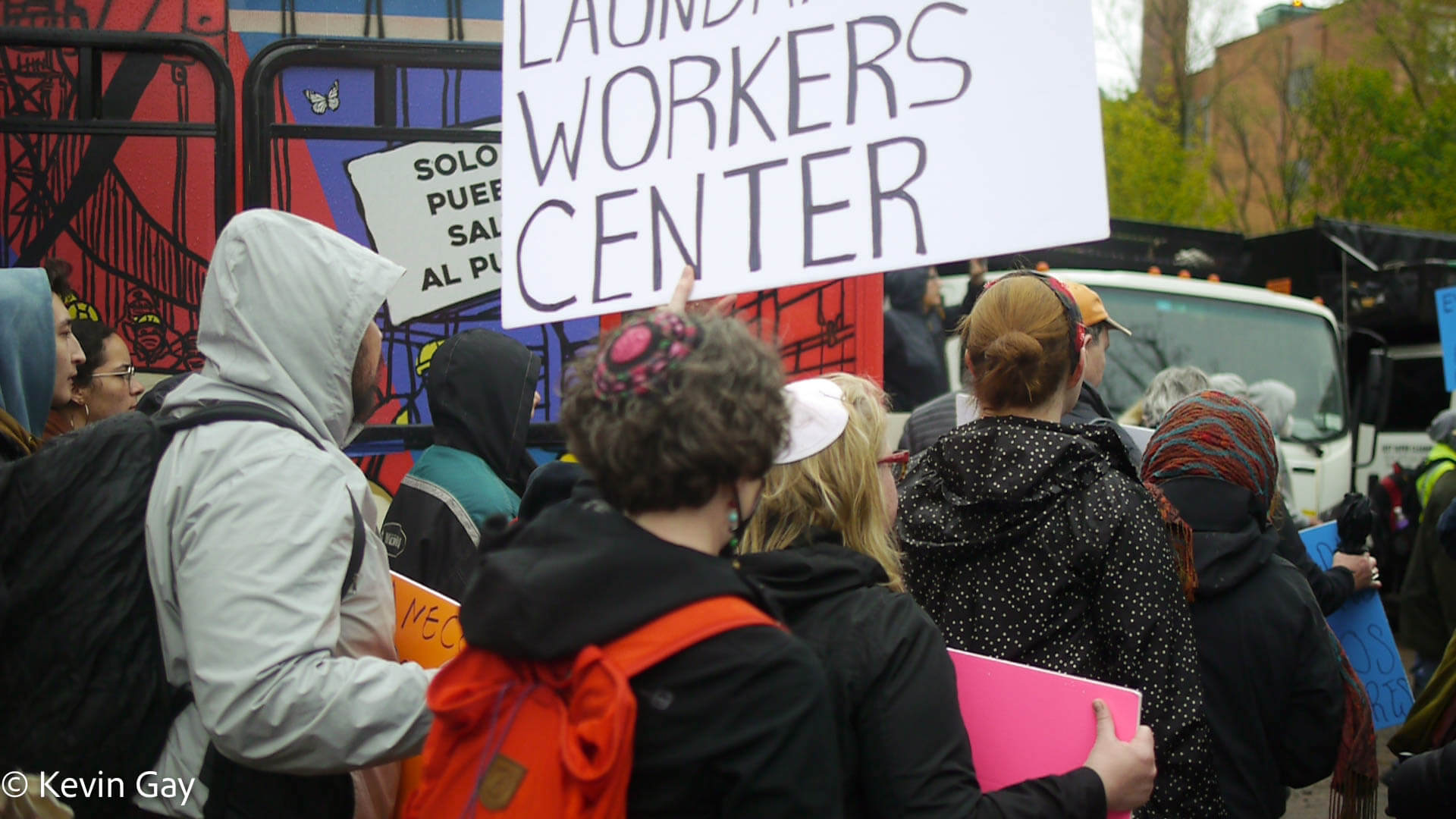I led an antisemitism training for workers in a labor dispute with their Hasidic bosses. Here’s what I learned
I often hear the complaint that ‘no one is talking about antisemitism’ in organizing spaces, and that is simply untrue

Members of T’ruah and the Laundry Workers Center picket in solidarity with the Cabricanecos, March 2023. Photo by Kevin Gay
“Why do all Jews give their children the same haircut?”
I got this question during an antisemitism training I led for a group of Brooklyn construction workers known as the Cabricanecos. These immigrant workers, most of them from Cabrican, Guatemala, are campaigning for fair wages and workplace safety from their Hasidic Jewish bosses. T’ruah, the rabbinic human rights organization where I work, is supporting their cause.
The question, referring to peyos, was asked in good humor, but it was part of a deeply serious conversation. The workers want to be careful to avoid engaging in or encouraging antisemitism in their campaign. The participation of “accomplice” rabbis from a range of denominational backgrounds in the campaign has made it clear to the Cabricanecos that their bosses are mistreating them in violation of Jewish law and ethics, and this exploitation is actually at odds with their employers’ Jewish identity.
Our training highlighted for me an essential lesson I’ve learned over and over again as a rabbi and organizer engaged in fighting antisemitism for many years: Relationship-building is the key component of success.
With the reported rise in antisemitism over the past few years, there have been growing efforts to stem the tide in antisemitism, and a $25 million campaign with slickly produced videos and social media posts.
Posting a blue square feels good, but too often recent efforts fall into the trap of performative activism. Many of these recent efforts are missing that relationship-building that is a core component of countering antisemitism and identity-based hate.
Too often, I see members of my own communities complain that “no one is talking about antisemitism” in organizing spaces, and that is simply untrue. Before making that kind of claim, I encourage fellow white Jews to build relationships and spend time in communities where we are not the majority or predominant voice.
Over the course of the Cabricanecos campaign, I’ve helped to organize rabbis to meet with their management and labor organizers in negotiations. In partnership with the Laundry Workers Center, we’ve marched together to worksites and stood on the picket line to call for equitable treatment and dignified working conditions.
At their request, I led a training in Spanish to unpack common antisemitic tropes and myths together. Our relationship and common goals were a solid foundation for learning about each other’s struggles with curiosity and empathy.
The workers – several of whom I’ve gotten to know as we stood on the picket line in front of their employers’ offices for the past year – brought candid questions to our conversation. Their interactions with the Hasidic community in Bed Stuy has been the first interaction they’ve ever had with the Jewish community. Our conversation covered broad ground, and we highlighted the need to recognize that antisemitism is not just a Jewish problem; it’s everyone’s problem.
We shared historic and personal narratives of migration and finding opportunity in Brooklyn as Jewish and Guatemalan community members, and dug into stereotypes that arose both on the worksite and outside of it.
Some of the Cabricanecos have strong Christian beliefs and had not previously grappled with the legacy of supersessionist theology. When that subject arose in our training, I was grateful for a campaign leader’s interjection: we were together to build solidarity and to listen, she asserted, not to debate theology. She refocused the group and encouraged them to hear how this theology had impacted Jewish communities for centuries, and to center that goal in our training time.
With a foundation of strong relationships like these, the inevitable mistakes made in the process of unlearning biases become an opportunity for growth instead of shutting down conversations.
The training was not limited to a lachrymose review of our mutual histories. We also made space to highlight the vibrancy and joy of Jewish life. At one point in our 90-minute Zoom conversation, I found myself hoisting several volumes of Talmud up to my camera. Holding the Shas set aloft, I explained in brief my own relationship to Jewish law and practice, and how the rabbinic tradition was at the heart of my own solidarity with the Cabricanecos campaign.
The reality is antisemitism stretches back to ancient Egypt and Greece, and the roots of modern racism are deeply intertwined with the history of medieval European Jew-hatred. Systems of oppression are interconnected, and white supremacy, racism, and xenophobia all play a role in perpetuating antisemitism, and vice versa.
A social media post simply isn’t going to change thousands of years of history. Changing hearts and minds requires engaging deeply with others. It is hard work that goes far beyond a hashtag, but has far greater potential for positive change.
If you only spend time in majority-white or majority-Jewish spaces, you cannot claim to know the conversation in other corners of the progressive world, or know the hearts of other faith and cultural communities.

My relationship with the Laundry Workers Center and the Cabricanecos has not only been formed in campaign flashpoint moments, but also over weeks of phone calls, picket line conversations, informal check-ins, and trainings like the one we hosted. That slowness and multi-stranded layering of relationships has allowed us to show up for one another more deeply, and with greater authenticity.
We must not only break up with the ways in which our biases wind their way into our institutions and expectations, but also be prepared to pause, listen and grow rather than rushing ahead to hit arbitrary benchmarks. We are in authentic relationships when we share meals together and pick up the phone long before a crisis arises, rather than expectantly looking for the response of presumed partners in moments of urgency.
To be blunt: If we could solve the issue of antisemitism on our own, we would have. We need accomplices, and they need us.
To contact the author, email [email protected].























